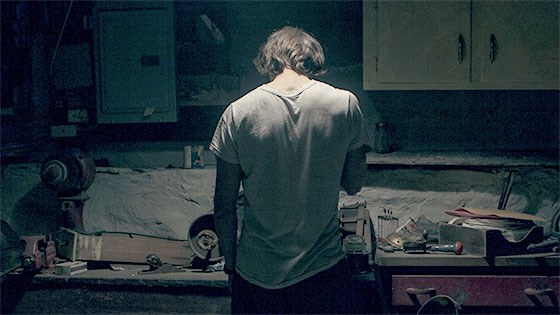 A Horrible Way to Die
A Horrible Way to Die, 2010
Sarah (Amy Seimetz) is three months sober, but sheís also coming up on a much more serious anniversary: itís been a few short years since her boyfriend, Garrick (AJ Bowen), was arrested and convicted of killing multiple women. Sarah begins to tentatively pursue a romance with Kevin (Joe Swanberg), a man from her AA Group, but her future with Kevin and her life itself are threatened when Garrick escapes from prison and begins to make his way toward her.
Making good use of a flash-foward/flash-back structure, this one doesnít quite go the full distance due to an underdeveloped central relationship.
Several familiar faces---specifically Seimetz, but also Bowen and Swanberg--enticed me to check this film out. And I have to say that when it comes to performances, this film is pretty strong. Seimetz never disappoints, and I think sheís pretty great here in what is almost a dual role. Past-Sarah is drunk, and maybe even using her drunkenness to stave off the sense that something with Garrick is not right. But Present-Sarah is sober and grappling with the twin blades of fear and guilt. In one conversation at an AA meeting, Sarah reflects that maybe things would have been different if she werenít drunk all the time. Itís hard to parse exactly what she means by this. Does she mean that if sheíd been sober Garrick wouldnít have killed those women? Does she mean that she would have figured things out earlier, possibly saving some women? Or does she possibly mean that he might have killed her if she werenít so believing and complacent for so long?
Swanberg is unsettling as Kevin, a guy who is all smiles and tenderness, but who is clearly not quite right. Watching his character interact with Sarah is painful, because you can see how this woman ended up with a man who was a killer. On their first date, Kevin takes Sarah to a restaurant where they are surrounded by wine bottles. Clearly uncomfortable, Sarah accepts Kevinís weak excuses and doesnít insist on leaving, a bad sign moving forward. Swanberg gives every one of Kevinís transgressions or quirks an uncomfortable edge, making you wonder how much we are seeing the real man, and how much of his behavior is actually intended to get under Sarahís skin.
Bowenís character and performance is the trickiest of the film, and I think that he mostly pulls it off. I started watching this film something like 10 years ago, and stopped very shortly into it because the dark themes and dizzying camerawork (more on that later) werenít what I needed that night. But one scene that I have always remembered is the opening sequence: Bowenís Garrick wakes up in a car, realizing heís dozed off. He goes to the trunk where he retrieves a bound woman. Talking to her in a comforting manner, he rubs her shoulder and tells her that sheís going to be okay . . . all before choking her to death. He exudes a kind of good guy energy, and itís jarring to see that transition from kind words and comforting tone to brutal murder. The film asks a lot of the character and the actor: wanting him to be scary, likable, maybe kind of sexy, and someone you can root for even as you fear for what heíll do to Sarah. Heís a dizzying mix of a boogeyman, flawed protagonist, and classic horror slasher killer. I think itís a credit to Bowen that he makes the character work as well as he does.
I also think that the structure of the film is interesting and engaging. We spend most of our time with Present Sarah, but the long stretches of flashbacks add depth to her story. We watch as she goes from gently questioning her boyfriend to deciding to figure things out to fear and denial about what sheís learned about the man she loves. The lingering question in the film is what will happen when the escaped Garrick finally closes the distance between himself and Sarah, and the flashbacks work to help us make our own predictions.
There are two things that donít quite work in this film, which is a shame because it does have a lot going for it. The first is that the flashback sequences donít feel quite adequate to me in terms of carrying the weight of justifying certain character decisions. Garrick feels very much like a character who was written for a movie. Yes, weíve all heard stories about men whose wives had no clue that they were killing on the side. But weíve all seen those guys, right? They arenít empathetic teddy bears, they are narcissists who lived double lives. Garrickís loyalty to Sarah doesnít quite check out for me. The movie needs him to be a monster and a loving boyfriend, and Iím not sure that there really are people who actually have those two halves, only people who are good at role playing the latter.
Then thereís the camera work. I mean, guys. Guys. Thereís the slightly-shaky hand-held camera work, and then thereís whatever is happening in this film. At several points it looks more like a parody of modern filmmaking style than something trying to be good. Many scenes begin with the camera out of focus, okay, fine. But then as a character is speaking the camera will veer wildly from side to side, or drift up and to one side. There are a handful of times that this technique manages to serve as an extension of Sarahís intoxication or her fear and disorientation. At other times, it comes off as being ďartsyĒ without purpose.
The conclusion to this film is very interesting. Iím not sure I buy it, but I like it.
Certainly recommended for anyone who is a fan of the on-screen talent.












